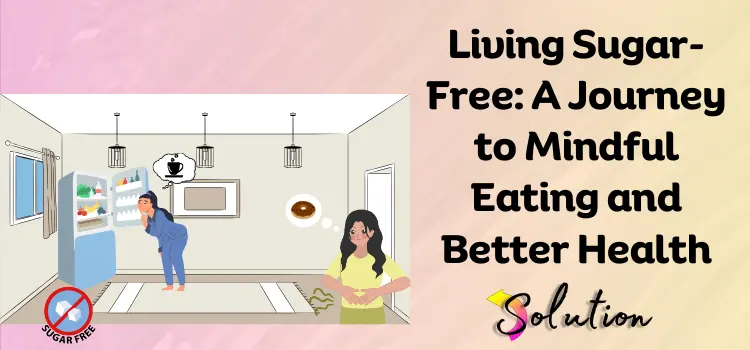
Did you crave sugar after every meal?
Are you a person who can’t focus on an activity without eating sugar? Did your mind always crave sweets, donuts, chocolates, and much more?
Sugar cravings are tough to beat. This is particularly true for individuals who have developed a habit of consuming a lot of sweets and sugary foods since their childhood or teenage years.
Body acne, mind fogginess, and weight gain are just a few of the negative impacts of consuming too much sugar. On the other hand, eliminating sugar completely from your diet could potentially enhance your overall health, energy levels, and mental clarity.
Most of us have already heard about the numerous benefits of quitting sugar from our favorite bodybuilders, actors, or fitness influencers. We even attempt to incorporate these benefits into our lives, but within 2-3 days, our commitment often feels like a broken promise. And this time, we end up consuming more sugar, leading to a repetitive cycle of guilt and frustration.
Stopping the unbeatable cravings for sugar, especially for someone who has a sweet tooth and used to consume it regularly, can be a challenging task.
So, how can you permanently get rid of sweet cravings and break free from the cycle of guilt and frustration? Let’s examine the various reasons you might be experiencing these cravings and explore effective strategies to overcome them for your overall health.
From Habit to Hormones: Decoding the Reasons for Sugar Addiction
Ever felt like you had to complete an important task, but suddenly you started craving sugar? It might be your favorite sweet dish, a brownie fudged in caramel, chocolates, pastries, or even a cold coffee.
When many health professionals are asked why a person may crave sugar, they often come up with common reasons, which are listed below:
- From our childhood, we have all developed the habit of starting our day with sugary cereals, flavored yogurts, or sweetened coffee. Consuming a sugary breakfast may cause a sudden rise in blood sugar, leading to cravings for more throughout the day. Furthermore, as the months and years go by, your body becomes accustomed to this daily sugar intake, leading to an increased addiction to it.
- The Sugar Crash Burnout: If you’ve always loved sugar, it’s likely that you’ve indulged in your favorite sweet dish for a day before ceasing consumption for weeks or months. Next to the day when you decide to stop consuming sugar after an overwhelming dose, you may start craving more of it and then experience a sudden crash in energy levels and mood, known as the sugar crash burnout. As a result, you may end up consuming more sugar at the end.
- Emotional Comfort: Seeing sugary items and sweets takes us back to our old childhood days, making us feel nostalgic and comforted. This emotional connection to sugar makes it difficult to resist indulging, even when we know it’s not good for our health.
- Hormonal Imbalances: Fluctuations in hormones like insulin and cortisol can lead to increased sugar cravings and overconsumption. This will weaken our brain’s power to control sugar cravings and may lead to a cycle of unhealthy eating habits.
- “Sugar = Mood” Conception: Whenever you feel lonely or down, sweets, especially chocolates, become your go-to comfort food. Chocolate helps in releasing endorphins and serotonin in the brain, which temporarily boosts mood and reduces feelings of sadness or loneliness. Reliance on sugar for emotional solace can initiate a detrimental cycle of pursuing fleeting solace through unhealthy eating practices.
Sugar’s Dark Side: How Excessive Consumption Harms Your Health
If you need the strongest motivation to completely eliminate sugar from your diet, all you need to do is understand the negative effects it will have on your body. Understanding the negative effects of sugar on your health will immediately motivate you to cut down or reduce your sugar intake.
Let’s look into the side effects that your body encounters whenever you consume excessive sugar:
- Excessive sugar consumption results in the storage of sugar as fat, leading to weight gain and obesity. Furthermore, consuming sugary drinks and snacks increases the risk of developing type 2 diabetes and heart disease.
- Liver Damage: Sugar is one of the most harmful substances for the liver, as excessive consumption can lead to fatty liver disease and other serious conditions, including Non-Alcholic Fatty Liver Disease (NAFLD).
- Mental Fog & Reduced Focus: Frequent sugar spikes and crashes affect brain functionality and make it difficult to concentrate on one activity during the day.
- Poor-Gut Health: Eating too much sugar leads to the growth of harmful bacteria in the gut, causing inflammation and disruption of the good bacteria. Furthermore, it results in digestive issues such as bloating, gas, and even Irritable Bowel Syndrome (IBS).
Mastering Sugar Cravings: Actionable Tips for Everyday Life
Let’s explore some of the effective tips that you can follow and execute in your daily routine to reduce or stop sweet cravings.
- Stay Hydrated: Keeping your body hydrated is one of the effective ways to curb sweet cravings. This will keep your stomach feeling full and may reduce the urge to reach for sugary snacks. Try to keep a water bottle with you and drink at least 3–4 liters of water daily. Additionally, add a lemon drink to your diet to reduce the sweet cravings even further.
- Opt for Natural Sweeteners: Instead of adding white sugar or artificial sweeteners, try using natural sweeteners like stevia, honey, or maple syrup. This will indirectly help reduce your cravings for unhealthy sugary foods.
- Plan Your Meals Ahead of Time: Making a meal plan ahead of time will help you resist the need to buy sugary snacks on the go. Junk food and sugary snacks are simple to reach for when you’re hungry and don’t have anything planned. Giving your body what it needs by preparing balanced meals and snacks in advance can help reduce cravings.
- Identify Triggers and Avoid Them: In order to end the cycle of sugar cravings, you must first identify what prompts them. The presence of certain factors, such as a sugary treat supply at work or emotional lows, such as boredom or worry, can trigger cravings. You can learn to recognize patterns in your cravings by keeping a notebook and recording the times and places they occur. Discover what triggers you, then avoid or control them.
- Surround Yourself with Healthy Options: One of the most influential factors in how people eat is their immediate food environment. Having nutritious snacks on hand rather than sugary ones will help you control your snacking habits. Yogurt, fresh produce, and healthy dips like hummus should always be on hand in the fridge. When hunger hits unexpectedly, having nutritious options ready to consume keeps you from reaching for unhealthy food.
Breaking Free: The Path to a Life Without Sugar Cravings
It takes time to learn what sets off your sugar cravings, practice mindfulness while making decisions, and put your health first if you want to overcome your sugar addiction. You may strengthen your ability to resist temptations and form long-term habits by drinking enough water, making a food plan, and surrounding yourself with healthy options. Learning to enjoy life without letting sugar control you is more important than denying yourself.
Substituting natural sweeteners for refined sugar or dealing with emotional triggers are just two examples of the little things you can do to improve your health and vitality. Maintain a steady routine, reward yourself when you succeed, and eat healthily overall. If you put in the work now, you’ll be able to live a life free from sugar cravings and full of energy and clarity tomorrow.


